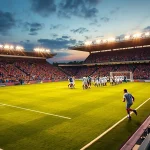Economic Impact of UK Sports on Local Communities
Sports activities in the UK significantly influence local economic impact, contributing both directly and indirectly to community prosperity. The UK sports economy generates revenue not only through ticket sales and merchandise but also by stimulating local businesses such as restaurants, hotels, and retail outlets. When spectators attend matches or events, their spending circulates within the local economy, creating a multiplier effect that supports various industries beyond the sports sector.
Moreover, sports venues and clubs act as hubs for social activity, drawing visitors and fostering community engagement. This interaction drives further economic benefits by promoting local services and increasing demand for transport and accommodation. The sports sector’s role as a catalyst for local economic growth is clear: it creates an ecosystem where benefits extend well past the playing field.
Have you seen this : How Can UK Sports Inspire Local Entrepreneurs?
This growth is often enhanced in towns with major sporting events or thriving clubs, emphasizing how sports activities benefits transcend cultural value, enhancing employment opportunities and business sustainability. Understanding the broader economic impact of UK sports reveals their vital role in supporting resilient, vibrant local communities.
Income Generation Through Sports Clubs and Events
Direct and grassroots sports clubs revenue in the UK plays a crucial role in fostering local income streams. Professional clubs generate significant ticket sales, sponsorships, and merchandise income, which flows into the surrounding community. Beyond ticketing, these clubs often engage local vendors, boosting the local economy through procurement and service contracts.
Also to discover : How do grassroots programs influence UK sports talent?
Hosting major sporting events amplifies this effect, driving substantial event economics UK benefits by attracting visitors who spend on accommodation, dining, and transport. Such events create temporary spikes in income, benefiting local businesses and augmenting municipal tax revenues. Furthermore, recurring fixtures build steady economic activity, maintaining consistent financial inflows for communities.
Local governments frequently capitalize on the financial uplift from these sports activities benefits, reinvesting revenues into infrastructure and community projects. The symbiotic relationship between sports clubs and local economies underscores how sports clubs revenue translates into broader social and economic value, establishing sports events as vital pillars of local income generation and sustainable community development.










